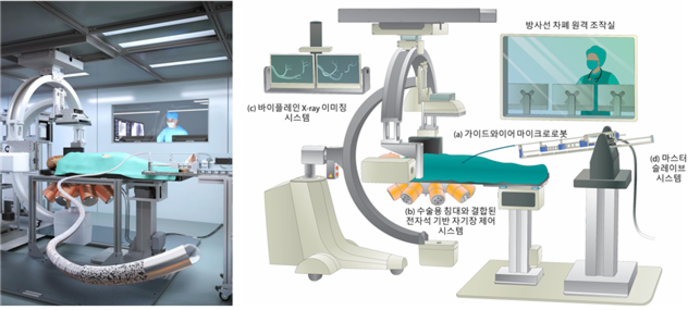
Image Credit: Daegu Gyeongbuk Institute of Science and Technology (DGIST)
The apparatus, following additional tests and commercialization, could decrease the exposure of medical personnel to X-Ray radiation while searching for and treating blocked or narrowed blood vessels.
Cardiovascular diseases are the leading cause of death worldwide, and it is very important to be able to diagnose and treat these diseases in the most minimally invasive way possible.
Hongsoo Choi, Robotics Engineer, DGIST
At present, percutaneous coronary intervention (PCI) involves adding a guidewire via the large femoral artery in the groin or the radial artery in the wrist and skillfully controlling it until it gets to the aorta, which is the largest blood vessel in the body.
Next, a contrast agent is injected into the aorta, where it disperses into the coronary arteries that reach the heart. X-Ray images are then captured to detect blockages in these arteries. This intervention necessitates an enormous amount of expertise and can still result in vessel perforation. It also involves avoidable exposure of the medical personnel to X-Ray radiation, as the procedure is carried out at the bedside of the patient.
In the last few years, scientists have been examining the use of robotic magnetic platforms to enhance the remote control of this kind of procedure. However, the systems that have been created are mostly bulky and do not react fast enough.
Currently, Choi and his team have established a system that involves remotely regulating a magnetically steerable microrobotic guidewire by employing a controllable external magnetic field. The field is produced by an ‘electromagnetic actuation system’ composed of eight electromagnets set in a hemispherical arrangement under a surgical bed.
The patient has to be positioned on the bed, with the guidewire introduced into an artery and directed remotely by altering the magnetic field. The guidewire is composed of a biocompatible silicone tube that can travel via blood vessels with minimal surface friction. The tip of the microrobotic tube contains a neodymium-iron-boron permanent magnet and hard-magnetic composites for magnetic steering.
The scientists first checked the apparatus using two-dimensional (2D) and three-dimensional (3D) printed blood vessel models. Next, they checked it in anesthetized pigs, managing to remotely regulate the guidewires via tiny and tortuous arteries in the kidneys, the pelvis, and the heart.
Our proposed electromagnetically controllable microrobotic interventional system (ECMIS) could reduce radiation exposure of physicians by empowering them to conduct the procedure remotely in an X-ray shielded control booth using low-strength magnetic fields. It also does not require the high level of training needed for conducting conventional PCIs.
Hongsoo Choi, Robotics Engineer, DGIST
Further tests and enhancements are still needed, but the researchers are already keen on further altering their system so it can also target vessels in the lungs and nervous system.
Journal Reference:
Hwang, J., et al. (2022) An Electromagnetically Controllable Microrobotic Interventional System for Targeted, Real-time Cardiovascular Intervention. Advanced Healthcare Materials. doi.org/10.1002/adhm.202102529.